European cities announced plans to curtail mass tourism after the pandemic with Prague seeking cultural visitors instead of partygoers and Amsterdam looking to "restore its true identity".
City leaders said the empty streets brought about by the Covid-19 crisis exposed how urban areas were too dependent on foreign tourists, who were already becoming a nuisance.
Hana Trestikova, a member of Prague’s city council, said the city wanted “tourists that are more focused on the cultural”, instead of the crowds of foreign partygoers who visit the Czech capital.
“We can’t do this to the Prague citizens any more,” she said at an event hosted by the Barcelona Centre for International Affairs on Friday.
“We found that the city centre was very vulnerable because it was focused only on tourists and not so much on locals.”
Victor Everhardt, a deputy mayor of Amsterdam – a city that already has a tourist tax – said that "before the pandemic, many Amsterdam residents in the centre no longer felt at home in our own city".
The influx of tourists “caused a sense of alienation” and led to overcrowded streets, anti-social behaviour and an “unpleasant atmosphere”, he said.
Amsterdam residents were “avoiding certain areas” while grocery shops disappeared or struggled to survive, Mr Everhardt said.
“As Amsterdam is looking to restore its true identity, we see other cities in Europe doing the same. That is both encouraging and inspiring,” he said.
In Barcelona, unemployment jumped 60 per cent in the city’s old town during the pandemic, said deputy mayor Laia Bonet.
Half the residents in the central district are foreigners, including low-income and “very high-income” migrant populations, she said.
“Barcelona’s old town … has basically become a place to visit,” said Ms Bonet, who leads the city’s 2030 Agenda to transform the city in the next decade.
“Our city centre will not be able to survive other shocks if we don’t change the current economic and social model” to make the city “more liveable", she said.
André Sobczak, a deputy mayor in the Nantes metropolitan area in France, said the city had taken the opportunity brought about by Covid-19 travel restrictions to encourage more local tourism.
“We want to have a new map that we can bring to our local citizens here and to invite them to see what is happening here,” he said.
Ms Trestikova said similar efforts in the Czech Republic were focused on "improving access to culture and the cultural heritage of Prague”.
She said the city was working on “telling locals that Prague has much to offer”.
Specific plans include improving the equivalent of London’s Oyster card, for travel on public transport, to “make cultural heritage more accessible to Prague residents”.
“We have to focus on [the] interests of Prague and of the local people, and do that as a priority,” she said.
Barcelona is also keen for people from nearby areas to “rediscover their own city centre” Ms Bonet said.
But the Catalan city is also planning to expand into new economic sectors, including the digital and energy fields, she said.
“Cities across Europe have increasingly become service-based economies that have flourished with mass tourism,” she said.
“For decades, it clearly worked. It created jobs and it brought money into the city.”
“However, the Covid crisis and the halt in global mobility have put an end to the vibrancy of our city centres.
"It happened so fast we cannot but ask ourselves whether we want to go back to normal, and in fact whether this normalcy was ever anything more than a facade."
A city centre with “people who live there, people who work there and of course people who visit us” is the aim of Barcelona’s plans, she said.
She also called for “reskilling programmes”, so that low-skilled hospitality workers could find new jobs in different industries.
Mr Everhardt, in Amsterdam, said the pandemic had “highlighted which neighbourhoods have become too dependent on visitors”.
“An economic monoculture focused on visitors is not only undesirable, but is also very vulnerable,” he said.
Specific plans include more housing and green spaces in the city centre and more room for cyclists and pedestrians, he said.
Amsterdam brought in restrictions on tourist shops, hotel developments and short-term holiday rentals in busy areas.
The city, famed for its canals and bicycles, wants to “make sure that not all neighbourhoods and streets look alike”, he said.
“They all have their unique and diverse qualities – a vibe of their own just like they had before the arrival of mass tourism.”


